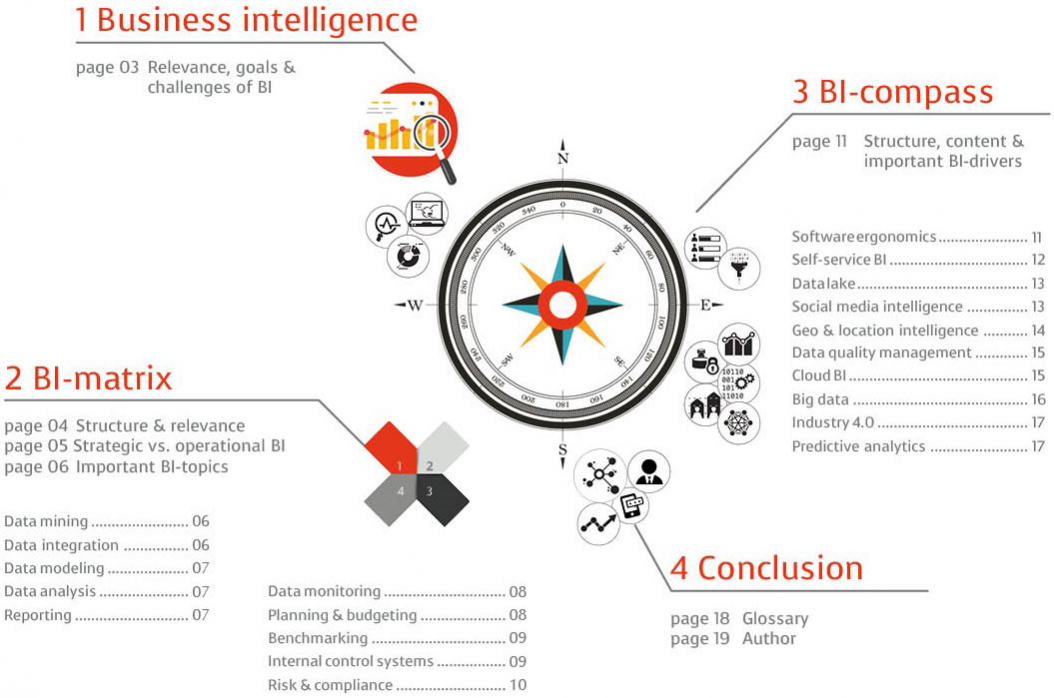Agenda
The BI travel guide creates a solid information base to drive your company's decision-making process. As you can see from the following agenda, we address significant BI trends according to strategic and operational level and list them using a process illustration. A journey worth taking!

BI trends
Reporting is a decisive success factor and a prerequisite for efficient corporate management. Companies react immediately to market opportunities as well as negative developments in turnover and costs in order to be successful in the long run. Appropriate reporting plays an important role in this.
Reporting deals with the analysis of business development. For this purpose, among other things, controllers make comparisons between target and actual values and examine whether budget targets are being met by certain departments. The aggregated and evaluated data of the standardised report enable those responsible to fulfil their monitoring and management tasks.
Our software solutions allow you to create your individual reports in no time - adapted to your corporate design - and share them with the right contacts. We guarantee you a secure decision-making basis for your entrepreneurial actions based on your individual needs.
Learn more in our BI travel guide.
Big Data stands for large amounts of digital data as well as for their collection and evaluation. It is also the collective term for all digital technologies, architectures, methods and processes that are necessary for this.
Experts assume that the volume of digital data worldwide will increase tenfold in the next few years due to the internet, social networks and mobile devices.
But is it only about data volumes? Big Data is first defined by data volumes that are too large or too complex or change too quickly. They can also be too weakly structured to be analysed with manual and classic methods of data processing.
The 5 fundamental Vs in Big Data are:
- Volume
- Validity
- Value
- Velocity
- Variety
Cloud BI provides analysis and reporting functions and the associated content via the internet. Cloud BI applications can usually be accessed via any browser and on any mobile device. Also known as "Software as a Service" (SaaS) Business Intelligence, Cloud BI requires that all necessary components are provided and managed independent of location.
What about the issue of security?
Cloud BI raises questions for companies about data security and storage location. Business-critical data must be transferred securely to the cloud and effectively protected from unauthorised access. In addition, there are regulatory requirements in which data storage must be ensured within the European Union.
Learn more in our BI travel guide.
Data integration is the process of bringing together data from multiple databases for use in an application. Simply put, data integration is the essential link between data and knowledge. Companies thus ensure that their diverse databases are connected.
Often in practice, custom applications are developed to transfer data from different sources into a common format. However, as soon as the amount and variety of data increases, the data management requirements overwhelm the user. Complex coding and extensive hardware investments are then required.
Our software solutions work on the basis of precise data conversion to create dashboards, visualisations and reports that accurately reflect your company's information. Optimal data integration frees you from manual analysis and forecasting. It reduces the error-proneness that takes place during data conversion.
A data lake is a repository for data storage that holds huge amounts of raw data in its original format until it is needed. While hierarchically structured data warehouses store the data in files or folders, data lakes store it in a flat architecture.
The main differences between a data lake and a data warehouse are:
- Data retention
- Types of data
- Users
- Changes
Data mining uses knowledge from the fields of computer science, mathematics and statistics for the computer-aided analysis of databases. For this purpose, the analysts use artificial intelligence (AI) methods, among other things, to examine large data sets for new cross-connections, trends or patterns.
The methods used for data mining each have defined goals and are assigned to individual tasks. These tasks can be divided into the following individual areas, for example:
- Classification
- Segmentation
- Forecast
- Dependency analysis
- Deviation analysis
Data models represent what data is used and what format is needed for different business processes. By accurately representing the requirements of the information system, data models facilitate communication business and technical development.
A data model can be concrete or abstract. It contains the following main components:
- Data type
- Data element
- Data source
- Event source
- Link
Data monitoring is a common business practice that routinely checks critical business data for quality requirements. The goal is to ensure high data quality and compliance with predefined standards.
Data monitoring enables companies to proactively maintain a high, consistent standard of data quality. By routinely checking stored data, companies can avoid resource-intensive data preparation.
We know our stuff! Use our software solutions for active monitoring. Data anomalies, the framework conditions of which you define beforehand, are noticed via push notification, immediately retrieved via access and visualised by means of reporting.
Learn more in our BI travel guide.
Data quality management encompasses all measures that enable an asset-oriented view of data in a company.
Data quality illustrates the suitability of data to describe reality. In particular, it describes how reliable data are and how they can be used as a basis for planning one's own entrepreneurial actions.
Decisions are made, market opportunities evaluated and negotiations conducted on the basis of data. There is a correlation between data quality and decision quality. Therefore, data quality is of central importance for decision-makers.
For us, data quality management is no problem! With our software solutions, it is possible to make all data available consistently, up-to-date and quickly. We create transparency about data and business processes so that reliable analyses can be carried out and, as a result, decisions can be made with confidence.
Learn more in our BI travel guide.
Data analysis is often used in connection with statistical investigations. In general, it is about gaining insights from available data. In doing so, the data is structured, ordered and presented differently with the help of various techniques, so that the results serve as a basis for solving problems. Data analysis itself can thus be classified as a separate process or technique within the larger framework of process improvement.
Our analysis and reporting software antares analy zer serves to improve business processes. Nowadays, companies cannot do without data analysis software in order to examine and better understand their business processes with the help of data analytic actions. This is the only way they can reduce business risks and prevent them in the first place.
Learn more in our BI travel guide.
Traditional BI software solutions provide simplified answers to the "who, what and how much". However, the question of "where" is often not asked. An objective evaluation is only possible if all important influencing variables are taken into account, including the spatial reference.
Geo & Location Intelligence starts with locating information on a geographical map, called geocoding.
Thanks to Google Maps integration, location-based analysis is possible with our antares analyzer analysis and reporting software. In terms of data refinement, your location-based data is specifically enriched with business-relevant, external data (e.g. purchasing power, product affinity, socio-demographic key figures, etc.).
Learn more in our BI travel guide.
An internal control system (ICS) helps data-driven companies to efficiently monitor and document their internal business processes and thus prevent acts of misuse and damage within companies. Thanks to the complete documentation of process controls and workflow-based monitoring, an internal control system ensures that your business processes run properly, transparently and securely.
An ICS must fulfil certain requirements that are described in various frameworks. The best known of these is the "Internal Control Framework - COSO", which is the internationally recognised standard for company-wide risk management. This is the basis for setting up a more comprehensive risk management system with an ICS system.
Our software module antares RiMIS® ICS complies with international standards and offers you an optimal risk management software solution.
Learn more in our BI travel guide.
Predictive analytics is primarily concerned with expected and possible events. It answers the question "What will happen under what conditions?". As a rule, the first step is the data visualisation of the forecast results with supplementary software. This is then discussed, forwarded and processed interactively in teams.
Predictive analytics can give competitive companies an enormous competitive advantage. It enables a better basis for planning and decision-making in order to derive promising measures.
Challenges of predictive analytics:
- Is all the data that is available used?
- What level of detail is considered in the analyses?
- How must data be modified to be "Ready for Predictive"?
- Which mathematical model fits the application?
- How do you prove in an evaluation that the predictive analytics approach works?
Often, no or poor risk management is the reason for corporate risks that lead to insolvencies, loss of receivables or job losses. However, risks do not only mean dangers. Conscious and controlled risk management offers the opportunity to secure the company's existence in the long term and even to generate competitive advantages. The goal is to identify and eliminate as many risks and gaps in business processes as possible in advance.
Compliance means "conduct in accordance with duty". In its implementation, it serves to ensure that the structure, actions and documentation of an organisation are in this dutiful form.
Frequently, the management systems (risk vs. compliance management) are established as separate, independent systems, which can actually lead to additional work and also loss of information. We, on the other hand, offer an integrated management system for governance, risk management & compliance management - antares RiMIS®.
With the help of our risk management system, preventive measures are taken to avoid the occurrence of breaches of duty and cases of damage and liability. In addition, potentials are built up to optimise competitiveness.
Learn more in our BI travel guide.
Self-Service BI describes the independent access to company data by business users. Before the introduction of self-service BI, analysts were always forced to contact the IT department directly for data queries. This created additional work for IT specialists and slowed down the work process.
In self-service BI applications, care should be taken to ensure that it is possible to introduce specific user rights in order to limit access to company data to designated personnel only. In addition, the processing of data within the company should follow uniform structures. Access to company data requires the provision of a suitable data warehouse, BI software and the use of reporting tools.
For more than 25 years, we have been advising companies on data warehouses, establishing and marketing BI software solutions and proving our know-how, which is the result of in-depth experience gained from a wide variety of tasks.
The user-friendly interface of our software solutions can be operated intuitively, so that the workload is reduced. The use of our online manual or the support system can also contribute to a better understanding for non-specialist users. Our self-service BI systems are often used in controlling, marketing, sales and wherever the analysis of company data plays a key role.
Download
Our BI travel guide serves as an orientation through the complex topic of Business Intelligence and helps to shorten the decision-making processes in your company.
Arrange initial meeting now

Jochen Brühl | Managing director
Select your desired option and arrange a non-binding and free consultation with our managing director Jochen Brühl.
We will answer your questions and make sure that you get to know our software in detail. We will be happy to show you the solution to your individual requirements. Afterwards, if you wish, we will present the performance spectrum of our software to you, live and directly, via web session or personally at your premises.
Information on data protection



